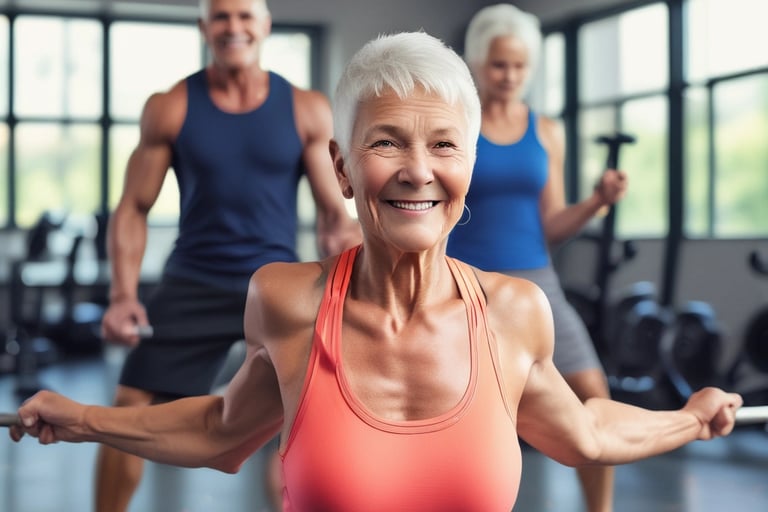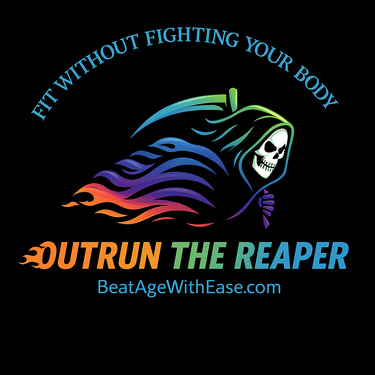The 2-Minute Reset and 10-Minute Workout for Active Agers
A simple, joint-friendly way for active agers and seniors to stay strong, mobile, and independent — without long workouts or gym equipment.
👉 Start with the 2-Minute Reset
👉 Try the 10-Minute Workout
A Smarter Way to Stay Strong as You Age
If you’ve ever skipped exercise because you didn’t have the time, energy, or motivation — you’re not alone.
Many people over 50 don’t avoid movement because they’re lazy.
They avoid it because traditional workouts feel overwhelming, painful, or unrealistic.
That’s why short, gentle routines work so well.
Ten-minute workouts lower resistance.
Consistency increases.
And the body responds.
At Beat Age With Ease, we focus on calm, joint-friendly movement that builds strength and mobility without punishment.
The Beat Age With Ease Method
This approach is built on two simple practices that work together:
✔ The 2-Minute Reset
Calms the nervous system and prepares the body to move safely.
✔ The 10-Minute Workout
Builds strength, balance, and mobility in a way that respects aging joints.
Together, they form a complete, sustainable system you can actually stick with.
The 2-Minute Reset
Calm Before Movement
Before you strengthen the body, it helps to calm the system running it.
The 2-Minute Reset is a short daily practice that reduces tension, improves breathing, and prepares the body to move with more ease.
How it works:
Slow nasal breathing to calm the nervous system
Gentle joint movement to reduce stiffness
No stretching, no strain, no equipment
Many people use the Reset:
First thing in the morning
Before workouts
After sitting too long
Anytime they feel stiff or rushed
This simple step alone often reduces discomfort significantly.
The 10-Minute Workout
Strength Without Strain
Once the body feels calmer, it’s ready for strength.
The 10-Minute Workout focuses on:
Functional strength for daily life
Balance and coordination
Mobility that supports everyday movement
A typical session includes:
Gentle joint warm-up (neck, shoulders, hips, knees, ankles)
Simple strength moves (chair squats, wall push-ups, hip hinges)
Light mobility for the spine and hips
A calm finish with breathing or stillness
Movements can be adjusted for your ability and done at your own pace.
No gym required.
No equipment necessary.
👉 Try the 10-Minute Workout Now
Why Gentle Strength Training Works Better With Age
Many people believe exercise must hurt to be effective.
That belief causes more injuries — and more quitting — than almost anything else.
Gentle strength training works because:
Muscles respond to consistency, not punishment
Joints thrive on controlled movement
Confidence grows when movement feels safe
Over time, people often notice:
Easier movement
Better balance
Less stiffness
More trust in their body
That’s real progress.
Isometric Exercises (Optional Bonus)
Isometric exercises — where muscles engage without movement — can be a helpful addition for people with joint sensitivity.
Examples include:
Wall presses
Gentle seated holds
Light core engagement
They build strength with minimal joint stress and pair well with short daily routines.
Get the FREE Isometrics workout for seniors eBook here.
How Often Should You Do This?
Simple answer: often enough to be consistent.
A good starting point:
2-Minute Reset: daily
10-Minute Workout: 2–4 times per week
That’s enough to see results.
More is optional.
Consistency is not.
Start Where You Are
If you’re new:
Try the 2-Minute Reset once a day
Add the 10-Minute Workout a few times a week
That’s it.
No catching up required.
No perfection needed.
More Ways to Build Calm Strength
A Note on the Path Forward
Beat Age With Ease is about helping the body feel capable again.
For those who want to explore the deeper mindset behind this approach — calm strength, patience, and presence — that path continues through The Still Warrior Within book series.
Not as a replacement.
As a progression.
Final Thought
You don’t need long workouts to age well.
You need movement that respects your body and fits your life.
That’s the heart of Beat Age With Ease.




© 2025. All rights reserved.
"Disclaimer: The fitness and exercise information provided on this website is intended for educational purposes only. It is not a substitute for professional medical advice, diagnosis, or treatment. Consult your physician or a qualified health provider before starting any exercise program. The use of any information provided on this site is solely at your own risk. We do not assume liability for any injuries or health issues that may result from using our content."
